Stay ahead of the curve as a political insider with deep policy analysis, daily briefings and policy-shaping tools.
Request a DemoAmid revelry and celebration, Black lawmakers ask tough questions, pledge to push through agenda
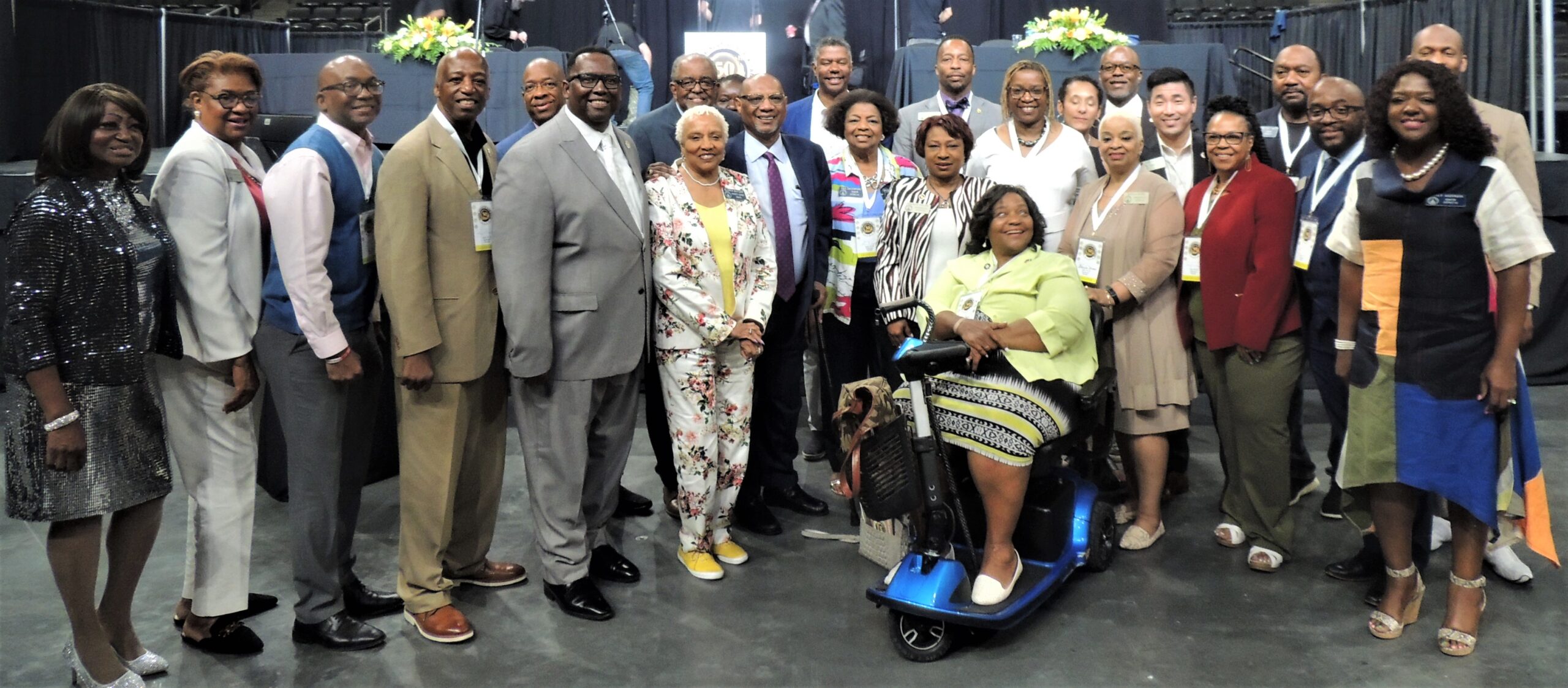
Members of the Georgia Legislative Black Caucus with Bishop Reginald Jackson (center) at their 50th annual conference held in Savannah, Georgia, on July 22, 2023. (Credit: Jill Jordan Sieder)
SAVANNAH — Many legislators and speakers at the Georgia Legislative Black Caucus’ (GLBC) annual conference last weekend expressed frustration and alarm around losing ground, locally and nationally, on voting rights, civil rights and access to equitable opportunities. Some have called on Black leaders to get better organized and to build coalitions with other groups to move legislation on the GLBC agenda that has languished in the Georgia General Assembly over the past few years.
What’s Happening
Last weekend’s GLBC conference in Savannah began with a presentation of “The State of Black Georgia,” which laid out racial and socioeconomic disparities in economics, education, social justice and health. During the two-day event, state legislators and some nationally prominent, politically-minded speakers explored solutions and strategies to make some headway.
Leading off the discussion was Bishop Reginald Jackson, presiding prelate of the Sixth Episcopal District of the African Methodist Episcopal Church, who presides over 500 churches in Georgia and has a track record of political activism nationally.

“The lives of Blacks are being trampled upon and undermined … with little response from Black leadership,” Jackson told attendees at a breakfast at the EnMarket Arena. He recounted recent legislative losses to the Black community, including changes to election laws that he said make it harder to vote, and new laws and policies aimed at eradicating diversity, equity and inclusion (DEI) standards from many areas of public life, including public education. And he noted that Georgia’s minimum wage remains the lowest in the nation, at $5.15 an hour.
“Most Blacks in Georgia have no idea of what’s happening in this state,” Jackson said, urging Black legislators to do a better job of speaking to their base. “We make up 30% of Georgia’s voting population. If we stand together and vote together, and turn out the vote, we’ll have immense power in Georgia.
“Too many of us are acting like we haven’t been through this before. This isn’t the first time they tried to turn back the clock,” said Jackson. Black leaders and Black preachers need to “get together at town hall meetings” and make sure that “Black kids know our history” and their power, he added.
The GLBC, the largest Black caucus in the nation, has 68 members and 10 associate members.
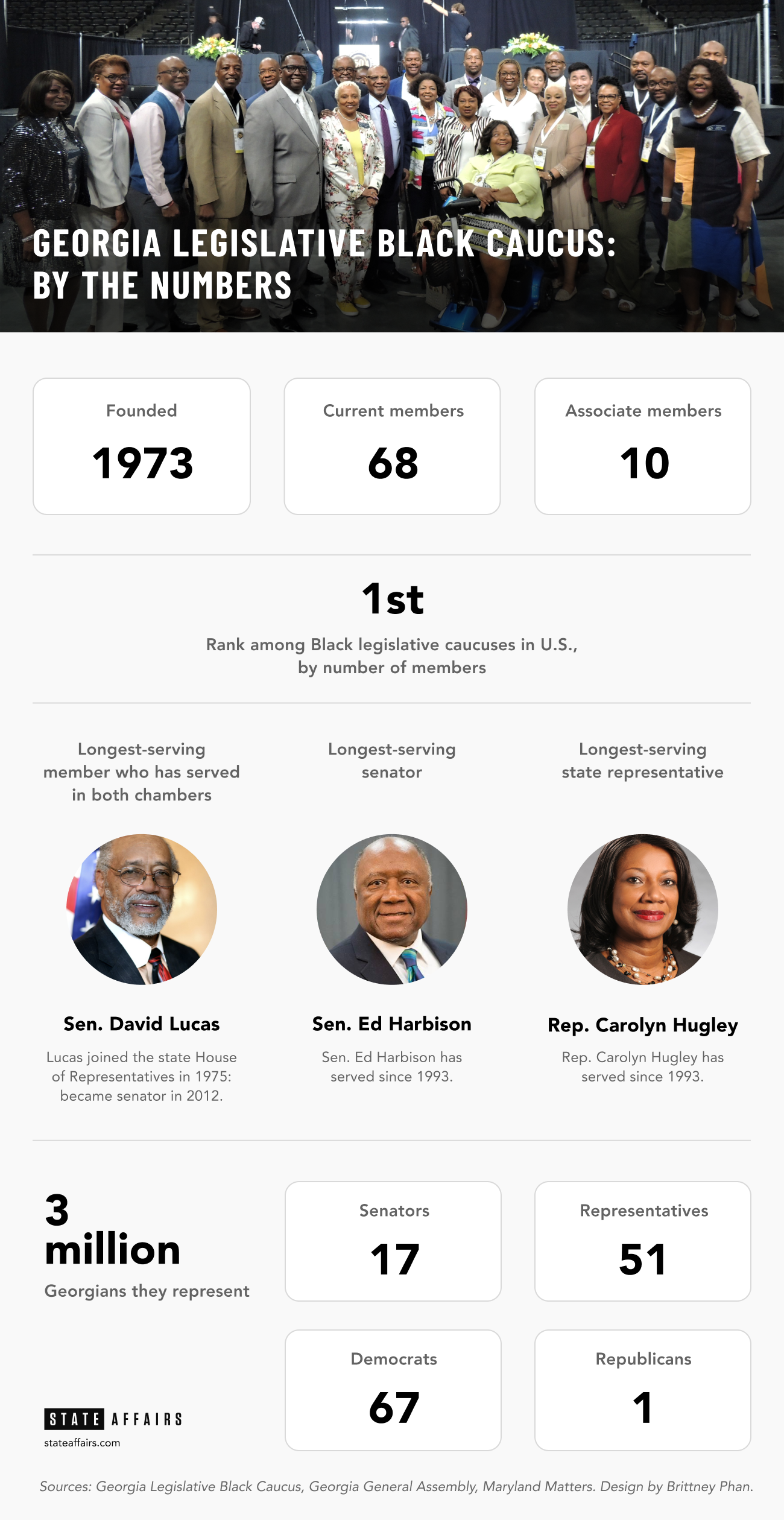
Why It Matters
Black legislators have regularly discussed the challenges of passing legislation in the General Assembly, and gathered together in Savannah, the issue was centerstage.
Democrats are outnumbered and outflanked by Republican majorities in the House (102 to 78) and Senate (33 to 23), and the state’s Republican governor has veto power on bills, and the first and final say on the budget. All but one of the 68 members of the GLBC are Democrats. Newly Republican Rep. Mesha Mainor switched parties two weeks ago.
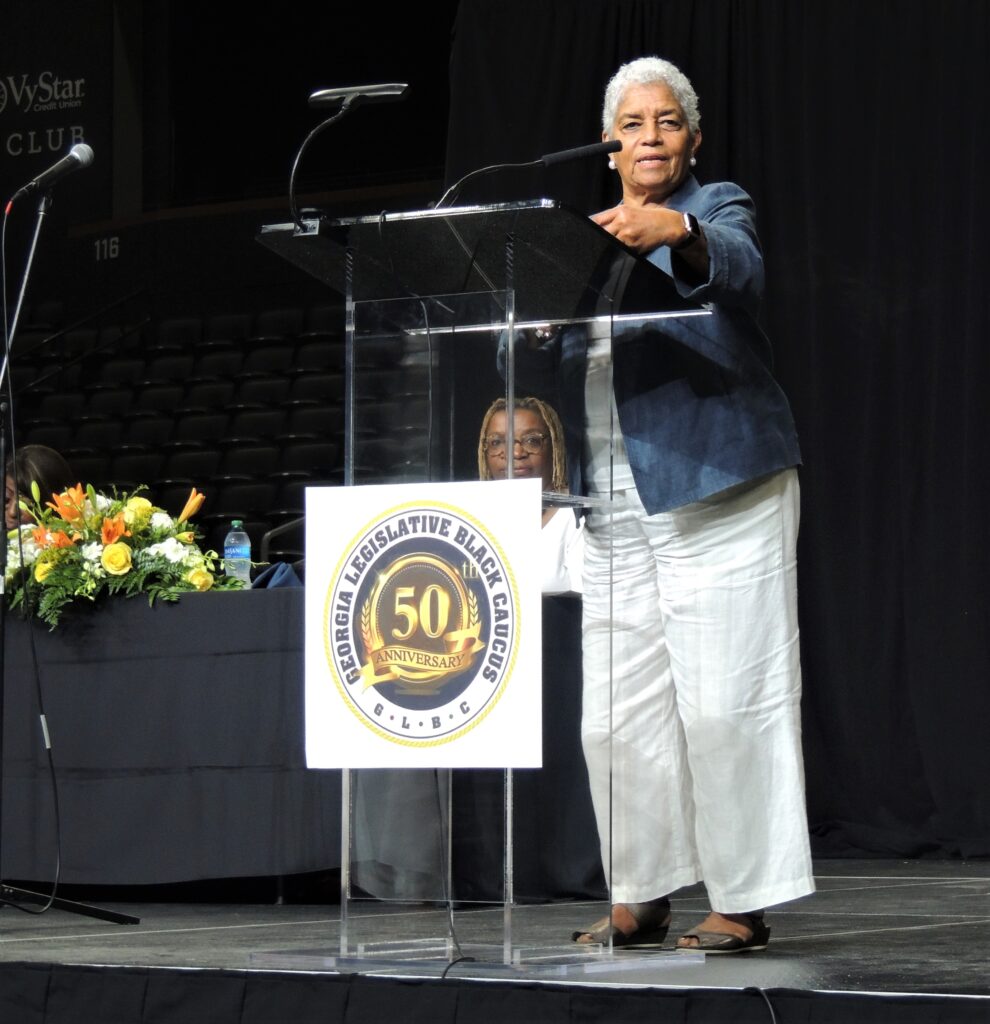
“This is a time of divisiveness, when we’re not in control, not the majority,” said former Atlanta Mayor Shirley Franklin during her keynote speech on Saturday. “In 2023, we have to find the angles, the areas where we can see the door open.”
She told the Black leaders assembled to build diverse coalitions and to try to find common ground on some issues. “We’ve got to have good allies … without compromising our principles,” she said.
Legislators explored key issues on the GLBC legislative agenda in panel sessions covering access to health care, voting rights, criminal justice reform, the challenges of Black farmers in Georgia, and international commerce. Conference organizers said the emphasis would be on evidence-based approaches to finding solutions to issues affecting Black communities as well as many other Georgians.
One panel that illustrated that approach focused on food, pharmacy and banking deserts in Georgia.
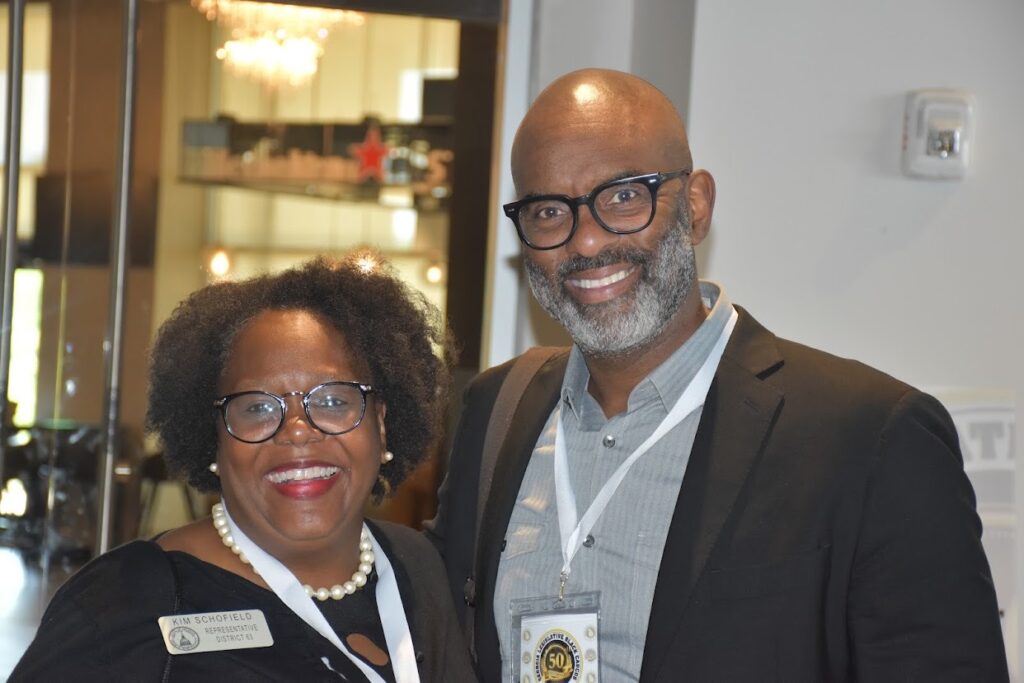
Reps. Kim Schofield, D-Atlanta; Viola Davis, D-Stone Mountain; Sandra Scott, D-Rex; and Doreen Carter, D-Lithonia, presented heat maps based on data collected by ZIP code, demonstrating that in many districts, a lack of these resources coincides with areas with lower household incomes.
The maps and data sets by district, developed by Rickie Keys, a public health equity expert with the Equitable Growth Fund, constitute what Keys calls a Resource Vulnerability Index (RVI) that provides a quantitative measure of the availability and distribution of critical infrastructure resources within a specific area.
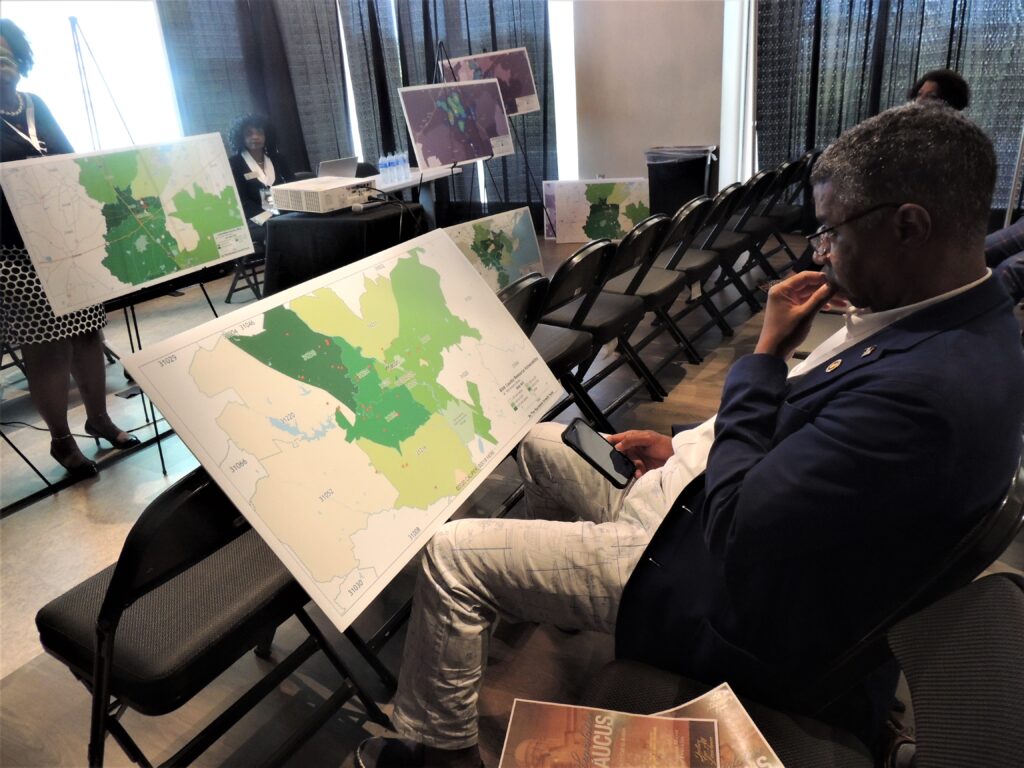
Schofield said the data and heat maps are part of an “evidence-based toolkit for legislators” they’ve developed to help them make the case for better services for their constituents.
For example, Schofield, Davis and Scott had presented data on the locations of bank closures by Truist Bank in their metro Atlanta districts two years ago, in an effort to persuade bank officials to open a new branch. Truist opened a new branch in Jonesboro in Clayton County last year, and another bank opened in Stone Mountain, which Schofield counted as wins based on their outreach.
Other cases for better services included:
- Schofield said many independent pharmacies in Georgia are disappearing, as pharmacists struggle with low Medicaid reimbursement rates for drugs they supply to low-income customers. Meanwhile, she said, “There is a movement to put pharmacies all online,” noting that CVS has been in the process of closing 300 pharmacies a year, for three years, since 2022.” Not everyone can get what they need from a pharmacy in the mail, she said.
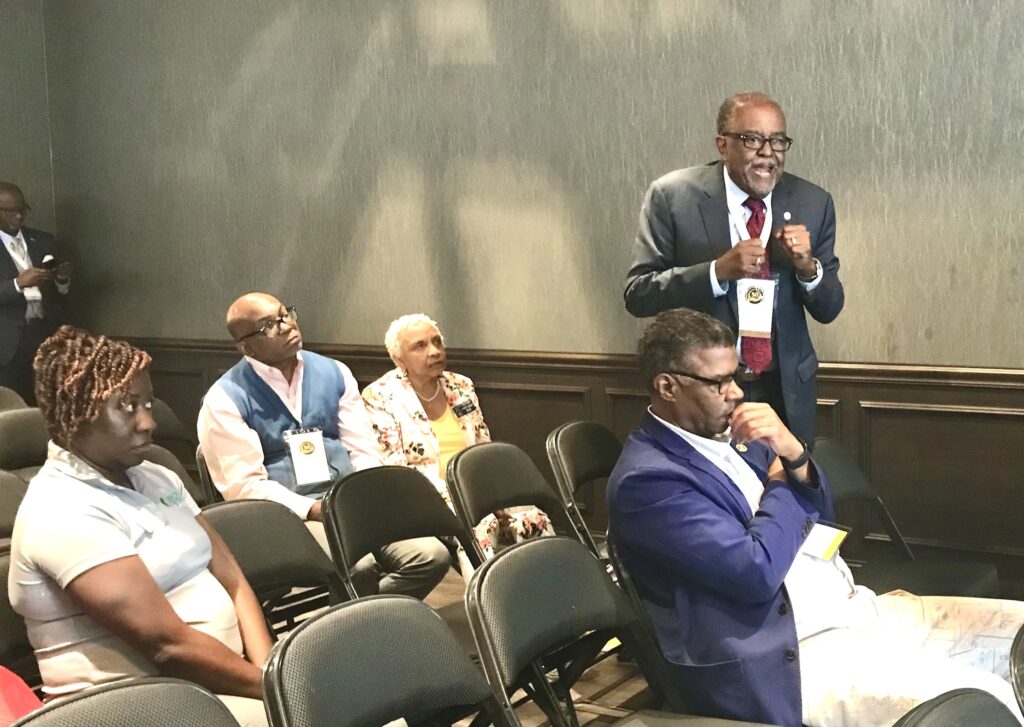
- Rep. Al Williams, D-Midway, said he’d been trying to negotiate with two supermarket chains to locate in his rural district, but has been rebuffed due to the low population density of the areas, which are also food deserts. Sen. Gloria Butler said she’s been trying to get Kroger to put more grocery stores in her district, which includes Stone Mountain, also with no success.
“It’s fantastic to have data driving the conversation. When you can see what’s actually happening, then you can have reasonable minds say, ‘Okay, these are the ZIP codes, these are the needs, now how can we deal with it?’” Beverly told State Affairs. “This is not just for the Black community; it’s for everybody … I think it really opens the door to have some robust conversations with our colleagues.”
Beverly said he and other Democrats would push Gov. Brian Kemp and Republicans to “invest some of our $16 billion surplus in this kind of infrastructure. If we do, we can leverage those investments to bring in 10 times that amount from corporations, who will take an interest … That’s how we get to sustainability. And it’s a dereliction of duty not to use it, given the needs in our communities.”
What’s Next

Scott said she would work to build more support for a bill she filed last session, HB 321, the Healthy Food Program Development Act, which would create a state program to expand access to healthy foods in areas with few or no grocery stores offering fresh produce, meats and dairy products.
The bill directs the Department of Human Services to coordinate with other state agencies, including the public health, agriculture and economic development departments, to offer grants and technical assistance to food retailers. It creates a “grocery ambassador” to assist store owners to expand into new markets, including sharing data with them on food desert locations.
The bill was not taken up by the House Agriculture and Consumer Affairs Committee this year.
Illinois Congressman Jonathan Jackson, the keynote speaker at the gala celebrating the GLBC’s 50th anniversary on Saturday night, warned legislators that the Supreme Court’s recent decision on restricting use of affirmative action policies in higher education may be a bellwether that leads to similar restrictions on considering race as a factor in admission to law schools, medical schools, business hiring and contracting decisions in Georgia.
“We’re in for the fight of our lives,” he said. “And as Black elected officials … you are called to stand in the way.”
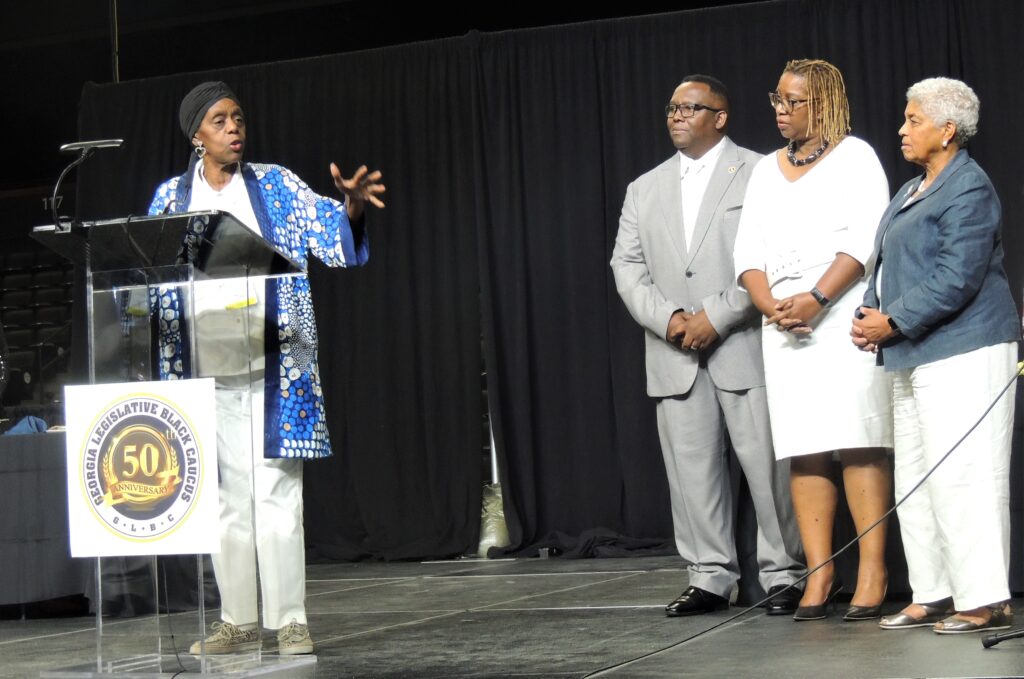
Former state representative “Able” Mable Thomas told GLBC members over lunch about a time she walked uninvited into a House budget meeting and asked the Republican leadership to fund her district’s priorities, which they approved on the spot.
“We’ve got to get bolder at the Capitol,” she said. “We’ve got the largest caucus … We’ve got to organize Georgia like it has never been organized.”

Beverly said voter mobilization is his top priority for the rest of this year and next.
“With the [redistricting] maps that will be redrawn, if we [Democrats] pick up six or seven seats, we could move to 84-85 seats in the House, and the whole conversation will change,” Beverly said. “I’ll be doing town hall meetings, everything it takes to make that happen … We’ve got to educate people and make them aware of what the stakes are.”
Rep. Michelle Au, D-Johns Creek, an associate member of the GLBC, and chair of the new, 11-member, bipartisan Asian American Pacific Islander (AAPI) Caucus in the General Assembly, said a good strategy to improve their collective clout is for the minority caucuses to join forces.
Au told State Affairs that the AAPI caucus is currently working with the Black caucus and the Hispanic caucus on voter engagement and voter access issues.
“With our coalitions representing a large swath of an increasingly diverse Georgia, we want to make sure that voters of all stripes can feel empowered and engaged in the election process,” she said. That includes printing dual-language ballots in counties with high immigrant populations and other citizens who speak English as a second language, and doing voter outreach to make sure they know when and where to vote.

Read these related stories:
Contact Jill Jordan Sieder on Twitter @journalistajill or at [email protected].
Twitter @StateAffairsGA
Instagram @STATEAFFAIRSGA
Facebook @STATEAFFAIRSUS
LinkedIn @StateAffairs
Header photo: Members of the Georgia Legislative Black Caucus with African Methodist Episcopal (A.M.E.) Church Bishop Reginald Jackson (center) at the Caucus’ 50th annual conference held in Savannah, Georgia, on July 21 and 22, 2023. (Credit: Jill Jordan Sieder)
Professionals still face licensing delays amid state’s transition to online system
The Gist Georgia’s professionals and business owners are still struggling to obtain professional licenses in a timely manner. As the Secretary of State’s Office rolls out its new Georgia Online Application Licensing System to expedite the process, the efficiency of this new process is being put to the test. What’s Happening Thursday morning at the …
Controversy over AP African American Studies class grows
Rashad Brown has been teaching Advanced Placement African American Studies at Atlanta’s Maynard Jackson High School for three years. He’ll continue to do so — even though the state’s top education official removed it from the list of state-funded course offerings for the upcoming school year. While Brown prepares to start teaching his class on …
Students, teachers, lawmakers blast decision to end AP African American history classes
ATLANTA — A coalition of lawmakers, civil rights leaders, clergy, educators and students Wednesday called on the state’s education czar to rescind his decision to drop an advanced placement African American studies class from the state’s curriculum for the upcoming school year. “This decision is the latest attack in a long-running GOP assault on Georgia’s …
Kamala Harris’ presidential bid reinvigorates Georgia Democrats
Georgia Democrats have gained new momentum heading into the November election, propelled by President Joe Biden’s decision to bow out of his reelection bid and hand the reins to Vice President Kamala Harris. The historic decision, announced Sunday, is expected to prove pivotal in the national and state political arenas and breathe new life and …




